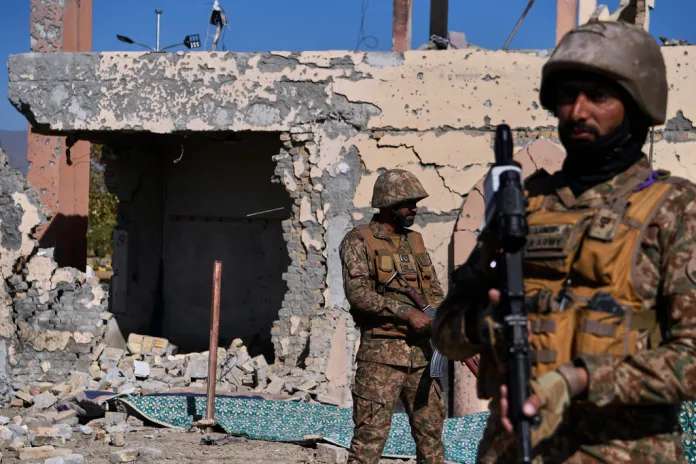Pakistan directly blamed Afghanistan and India for a deadly suicide bombing on Tuesday in Islamabad, further escalating tensions in the fragile region.
In a speech to the National Assembly on Wednesday, Pakistani Prime Minister Shehbaz Sharif blamed Afghanistan and longtime rival India for the bombing in the capital, which killed 12 people and wounded 35 others. Sharif portrayed the involvement as a pattern, further connecting India and Afghanistan to the Balochistan Liberation Army’s hijacking of a train in March, which killed 31 passengers.

“To say that external adversaries are not involved in these terrorist incidents is as absurd as calling night day and day night,” Sharif said.
“I want to say here with full force and confidence that we are fully aware of the actions of these enemies of Pakistan and external elements,” he added. “We have given them a crushing response before, and we will do so again, inshallah. You will never be allowed to obstruct Pakistan’s peace, progress, and prosperity.”
The Pakistani Taliban, TPP, denied any involvement in the attack. An offshoot initially claimed responsibility, but a commander soon contradicted it, according to the Associated Press.
The Washington Examiner contacted the Pakistani Embassy for additional information.
Just a day before the Tuesday bombing, Cadet College Wana, located along the Pakistan-Afghanistan border, was attacked by six terrorists. No civilian fatalities were reported after the army’s swift intervention, but all six terrorists were killed.
On Thursday, Pakistan’s Information Ministry said the attackers were all Afghan nationals affiliated with the TPP and that the attack was planned in and launched from Afghanistan. Some of the attackers were alleged to have used American-made weapons.
“The attack on Cadet College Wana was planned and controlled from Afghanistan,” the ministry said in a statement. “The attack was planned in Afghanistan by kharji Zahid and the final approval was given by [TPP Emir] Noorwali Mehsud. All the khwarij who attacked Cadet College Wana were Afghan citizens. The equipment for this attack was provided from Afghanistan, which included American-made weapons.”
Attached to the statement was a video showing a diagram of the assault and intercepted phone calls relating to the attack.
Speaking with the Senate on Thursday, Interior Minister Mohsin Naqvi divulged further details about the bombing. He said it was “related to Afghanistan,” that the suicide bomber was an Afghan national, and that seven facilitators of the attack were arrested.
“It is becoming very difficult for us; the way people from Afghanistan are coming here and attacking us,” he said, adding that the government would do “whatever is possible” to tackle it.
Naqvi also connected the bombing to illegal Afghan immigration to Pakistan, saying the government is dedicated to ensuring all illegal immigrants are deported.
Minister of State for Interior Talal Chaudhry said the suicide bomber didn’t even know “Pakistan’s language nor did he know of the country’s currency,” according to Dawn.
While Pakistan has struggled with terrorist attacks for decades, most occur in the border provinces. Defence Minister Khawaja Asif said on Tuesday that the bombing in the heart of the country was a “wake-up call” and that Pakistan is “in a state of war.”
“Anyone who thinks that the Pakistan Army is fighting this war in the Afghan-Pakistan border region and the remote areas of Balochistan, today’s suicide attack at the Islamabad district courts is a wake-up call,” he said.
Asif said the attack was “a message from Kabul, to which … Pakistan has the full strength to respond.”
The bombing, combined with the attack at Wana, he argued, has “raised the stakes in this state of war against Afghanistan. We should take this with the utmost seriousness.”
Leaning into the claim that India had a hand in the Islamabad bombing, Asif said Pakistan is “prepared to face the enemy on both the western and eastern borders.”
“If these people want a final round and for all-out hostility to begin, then what other option will we have?” he asked.
India has vehemently rejected the “baseless and unfounded allegations” that it was involved in the bombing. It said the allegations are a distraction from “the ongoing military-inspired constitutional subversion and power-grab unfolding within the country,” referring to a constitutional amendment passed Thursday that widened the power of Field Marshal Asim Munir.
Sharif took a softer tone on Wednesday during his speech to Parliament, saying Islamabad wanted “Afghanistan to also be an equal partner in peace.”
“But it is not acceptable that they make promises and then fail to act on them,” he said of the Taliban government. “The Afghan brothers and sisters whom Pakistan hosted as guests for forty years, providing them with resources, the world is witnessing today the return for that forty-year hospitality.”
Pakistan has long accused the Taliban of harboring the TPP, which uses Afghanistan as a springboard to launch terrorist attacks. Last month witnessed the nadir of relations, when Pakistani airstrikes in Kabul sparked a short-lived armed conflict that killed dozens of people and injured hundreds more.
Walter Ladwig, an associate war studies professor at King’s College London, told NBC News that the attacks and accusations illustrate the difficulties posed by the mutual belligerence between Afghanistan, Pakistan, and India.
SUICIDE BOMBER KILLS 12 IN PAKISTAN, WOUNDING DOZENS MORE IN BLAST HEARD FOR MILES
“The bigger problem is the absence of any real security dialogue among India, Pakistan, and Afghanistan,” he argued.
“Without any real regional intelligence sharing, every act of violence tends to be viewed through a political lens — as state-sponsored, rather than part of a broader extremist problem,” Ladwig concluded.

 The attack of Cadet College Wana was planned and controlled from Afghanistan. The attack was planned in Afghanistan by Kharji Zahid and the final approval was given…
The attack of Cadet College Wana was planned and controlled from Afghanistan. The attack was planned in Afghanistan by Kharji Zahid and the final approval was given…